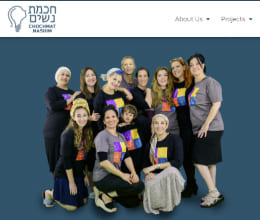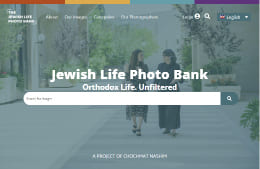Originally published in the In Jerusalem, March 30, 2018
Can one feel both devastated and inspired at the same time? These two emotions were my constant companions when I walked through the desert, together with agunot and former agunot, during Yad L’Isha’s first annual Eshet Hamidbar (Woman of the Desert) 22-kilometer walk.
I was invited as a journalist, but having had first-hand experience in the rabbinic courts advocating for my aunt, a former aguna, and having written on this issue for several years, it was personal as well.
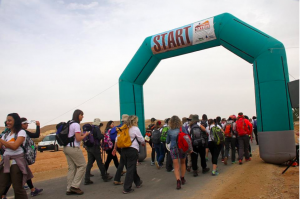
Founded 20 years ago, by Susan Weiss, together with Rabbi Riskin, The Monica Dennis Goldberg Legal Aid Center and Hotline is an organization under the umbrella of Ohr Torah Stone that provides female representation in rabbinic courts for women seeking divorce who cannot afford the services of a private advocate.
Yad L’Isha’s female rabbinic court advocates, versed in both Jewish and civil law, represent 150 women of all backgrounds every year. Pnina Omer, director of Yad L’Isha, says that the hike, produced by the Israel Marathon Corp., symbolizes the process and significant changes that women undergo while waiting for a get.
Getting up super early is not my thing, and indeed, I nearly missed the bus as it pulled out of the Modi’in parking lot. Luckily, I flagged it down and hustled on, to the predawn amusement of the gathered women (none of whom I knew), who good-naturedly teased me when I finally confirmed that I was indeed on the right bus.
We met the other buses – from Tel Aviv and Jerusalem, at the starting point of Khan Temarim, in the Arava community of Tzukim. Food, drinks and a DJ (yes!) welcomed us. Branded shirts and bib numbers for participants, as well as a massive “starting line,” all add to the atmosphere of a true sports event. Women stretched or grabbed a last cup of coffee. The energy was palpable. The women, 230 of us, some in skirts and baseball hats, others in tank tops and leggings, some speaking English, but mostly Hebrew, were all there for a common cause.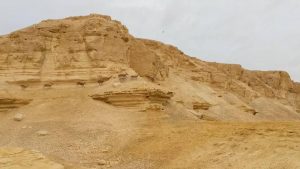
Some simply love hiking. Some know women who have been denied a divorce, and, others themselves still await divorce. Some are from Eilat, others Kiryat Shmona, and the rest of us are from somewhere in between, except for the three who have traveled from the US to join us.
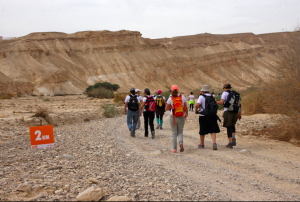
“In addition to my studies, I created a group for divorced women. It was important to me to help other women. There are 60 of us so far. The community doesn’t really acknowledge us, so we support one another. Rabbis want to help. They help financially, but don’t accept the women… within the community.” Of the 60 women, only two or three never suffered abuse. Yael believes this statistic reflects the taboo that divorce is in her haredi community, so that only those in the worst situations seek divorce.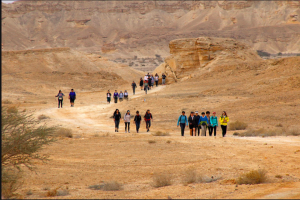
“I’ll start with my engagement,” she said. “I was 18 when I married. I met him twice, as is normal for my community. We met for 30 minutes the first time, and the second for two hours. The next time I saw him was six months later, at the wedding.”
“I knew immediately that something wasn’t right. In the yihud room, right after the huppa, I knew. I didn’t want to go home with him, but I had no one to tell. So, I went.”
Sarah became pregnant immediately and things grew worse. She reached out to her kalla teacher (who prepares a bride for marriage and intimacy), but the woman was ill-equipped to understand what Sarah was trying to convey. Sarah bore and raised three children in less than four years; she’d never contemplated birth control. Finally, her husband’s repeated abuse of the children, sending them to emergency rooms, strengthened her resolve.
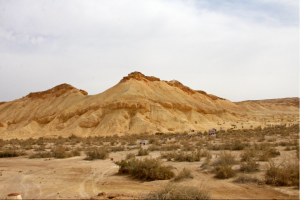
“I started to take care of myself; I had been depressed and I came out of my fog.” She went to the community leadership and reported her husband’s abuse. They called her a liar. After her fourth child, she asked for a divorce. The community sided with her husband and only the rabbinic court took her husband’s behavior seriously. He was hospitalized and diagnosed with schizophrenia, a condition his family had known about but had kept from her.
Some 10 months later, Sarah is free but ostracized by her community. She wishes they would support women like her, instead of casting them out because of divorce. After all, “I did nothing wrong. I did something right! I got my children out of a bad situation!”
I walked alone for a while, digesting the conversation. I am angry for her. I am angry at a community that abandons those who need them most. I am angry that she is alone with four children, as religious as she ever was, but an outcast. I wonder what has become of the piety and kindness for which her community was known.
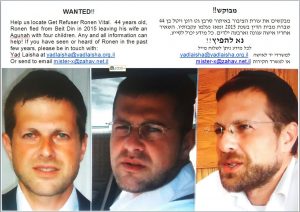
I watched as Yael and Sarah walked together, both betrayed by the ones they trusted the most, both rebuilding their lives for themselves and their children, both holding fast to the faith that bound them. I began to understand the desert metaphor.
THERE ARE ruts in the ground and the rocks are loose and sharp. I thought wistfully of my old hiking boots, regretting the soft soles of my Nikes. Watching my step so I wouldn’t twist an ankle, I found myself walking beside Orly Vital, an attractive woman whose smile exuded a warmth that made her instantly likable. It turns out that she is from my town and we know some of the same people. I asked what brought her to the hike, thinking she was there to support Yad L’Isha.
But, in fact, Vital is an aguna. Her husband disappeared three years ago, after seven years of refusing her a get. She is 37, and has four children, whom she is raising on her own. This information was so at odds with what I had assumed that I had to swallow twice before I could respond. We spoke for a long time and I was torn between being professional and being a friend.
The beit din (rabbinical court) is looking for her husband while his family aids his refusal and supports him financially. Vital sent me his picture and information on WhatsApp and asked that everyone post it in hopes that someone has seen him and can help find him. All she wants is to move on in life.
After speaking with Vital, I took a break from interviewing and appreciated the silence of the desert…. but for the crunch of hundreds of feet and the small sounds of distant conversations. The landscape has few trees, and the starkness and depth of the mountains felt biblical to me. Together, they created a scene perfect for sharing stories.
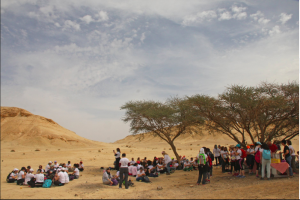
At the second pitstop, we gathered beneath a large acacia tree, where live music, soups and vegetables awaited us. I met the three women from the US, who had chosen the hike as the destination for their annual trip abroad. Their similar smiles made it clear that they were sisters (and their accents indicated New York). They told me the trip had special meaning: the eldest had been denied a get for several years. We finished the hike together, as she told me her story of divorce and recovery.
WE ARRIVED at the Arava Antelope Ranch where the DJ and an inviting grassy area awaited. I promptly collapsed – and met Efrat*, a petite woman with short hair and bright brown eyes. “I received my get a few years ago after being refused for over three years. I wasn’t considered an aguna because he was willing to give the get so long as I gave into his demands. We had a judgment in the civil court for child support, but when we went to the rabbinic court to arrange the get, he refused unless I agreed to reduced support – less than the minimum that was ordered. The judge looked at me and said, ‘You need to give him what he wants. He’s not refusing, he just has conditions. Accept it and you’ll get your get.’ It was a shock. This was before I found Yad L’Isha.”
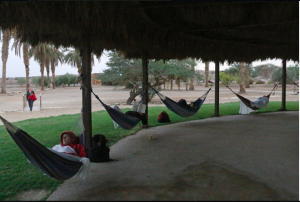
Efrat sighed, “Eventually, I couldn’t take it. It was breaking me down. But with counseling and coaching (from Yad L’Isha), I was able to accept his demands from a place of strength and not weakness. I believed in myself, in my ability to support myself and my children and to not be dependent on him. I’m not the same person that I was before, not in any way.”
I asked if he sees his children. Efrat shook her head.
“He has no contact with us at all. I gave up on close to NIS 200,000 that he owed, between child support, education, etc. But I still have to ask him permission to do things for the children (legally). Why do women have to buy their freedom? I go to pay for the kids and my receipts say his name – as if he paid and when I enroll them, I need to let him know. I’ll never marry again – for what? It’s jail. It’s very sad, I believe in Judaism and in marriage, but this way, marriage is jail.” Like the other women I’d spoken to, Efrat is rebuilding her life. Like the others, she has pain and has used it to become wiser, stronger, more capable.
After showers and rest, we were treated to an outdoor dairy buffet dinner and wine, compliments of the Gush Etzion winery. A concert, a serious talk on the subject of divorce refusal, and Q & A with former agunot made the subject personal for those who had not known an aguna until now. Omer announced that that very week, Yad L’Isha helped four women receive their gittin. Everyone celebrated this news with dancing – thanks to the DJ.
I took my aching feet to bed.

UP EARLY – again – the next morning to finish the hike, we observed how the Antelope Ranch earned its name. As we walked deeper into the desert, a herd of antelope thundered by. They were majestic.
They leapt across the mountain face from ledge to cave, and I could not help but see their freedom in complete contrast to the lack of freedom of some of the women on this hike.
I know it sounds trite, but those antelope were bound by nothing but nature and their own ability. Agunot are bound by the men they trusted most. The contrast was painful and the empty expanse of the desert with its silence offered no relief from the weight of the realization.
The last six kilometers were flanked by mountain ledges on one side and the rising sun on the other. Colors shifted and shadows retreated as the sun climbed in the sky. Shabbat was only hours away, yet we were in our own world.
I completed the hike with a psychotrauma counselor from Modi’in who was there for the experience and the sport of it. We hit it off and spoke at length, of family, of trauma and of healing. Together, we reached the finish line at Sapir Park where a lake with an unlikely and enormous flock of ducks awaited us. It was a literal oasis in the desert – complete with DJ (of course), food and drinks.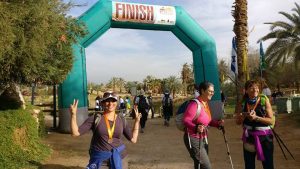
We all felt accomplished – beyond the physical hike. We had bonded around a communal cause. We’d internalized the understanding that any Israeli Jewish woman can be chained in marriage, as Omer had driven home, and that we all had reason to push for a solution.
It is my hope that Jewish leadership will commit to implementing solutions that do not leave women trapped or chained, rendering the need to raise awareness for agunot obsolete. If, God forbid, that does not happen, I expect to join next year’s Eshet Hamidbar and I suggest to anyone who can: join us.
*Names have been changed. Photo credit: Irit Amit

